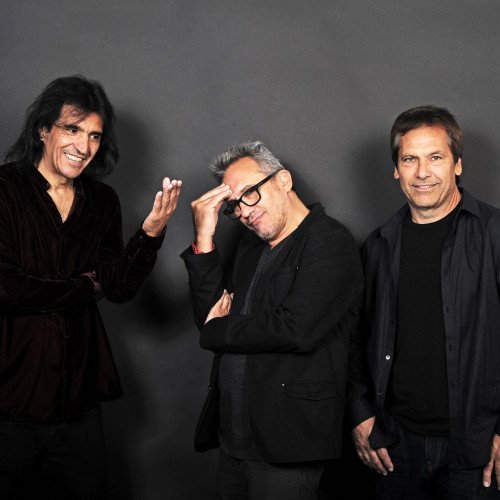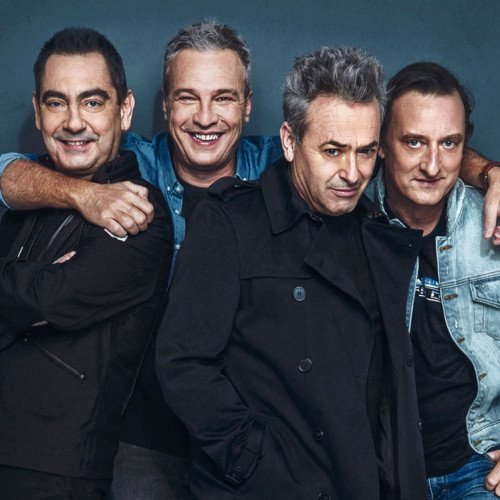Enanitos Verdes vs Hombres G

Enanitos Verdes
Enanitos Verdes (literal translation: "Little green dwarves", roughly equivalent to the English phrase "Little green men") is a rock trio from Argentina, formed in 1979 in the city of Mendoza. The band started in 1979, with Marciano Cantero (bass guitar, keyboards and vocals), Felipe Staiti (guitar) and Daniel Piccolo drums. That same year, they performed throughout the Cuyo region. Later they traveled to Buenos Aires to record a demo, with unusable results that were never released. In spite of this failure, they continued doing shows in Mendoza and in Buenos Aires. In 1984 the band added two new members: Sergio Embrioni (guitar and vocals) and Tito Dávila (keyboard). As a quintet they published the disc Los Enanitos Verdes, with the hit "Aún sigo cantando" ("I'm still singing"). Embrioni left the band in 1985. In 1986 they published their second album, entitled Contrarreloj (Counterclockwise), with the artistic production of Andrés Calamaro. The album included songs such as "Tus viejas cartas" ("Your old letters"), "Cada vez que digo adiós" ("Every time I say goodbye"), and "La muralla verde" ("The green wall"). Their third album Habitaciones extrañas (Strange Rooms) would arrive the following year. Produced again by Calamaro, it included "Te vi en un tren" ("I saw you in a train"), "Por el resto" ("For the rest") and "El extraño de pelo largo" ("The stranger with the long hair"). In 1988 they did an extensive tour, following in the footsteps of Miguel Mateos/Zas and Soda Stereo. During six months three particular concerts stood out: Viña del Mar (50,000 spectators), Mendoza, Argentina (35,000) and Santiago, Chile (32,000). In that same year they published their new LP, Carrousel. The song "Guitarras blancas" (white guitars) became one of the main hits of the album. A year later the group broke up, with Marciano Cantero starting his solo career. In 1992, the group got back together, recording the album Igual que ayer (Same as Yesterday). After recording four more albums, in 1998 they released their album Tracción acústica, with the US record company Polygram. This album made them the first Argentine group and third Argentine artist to sign with a US company. This album was nominated for the Grammies in the category "Best Latin Rock Album". They were part of the Watcha Tour 2000, which included seventeen shows along with Molotov, Aterciopelados, Café Tacuba and A.N.I.M.A.L.
Statistics for this Xoptio

Hombres G
Hombres G is a Spanish pop rock band, formed in Madrid in 1983. They are widely considered one of Spain's most prominent pop groups of the 1980s and early 1990s.[1] The band consists of David Summers (bass, vocals), Rafael Gutierrez (guitar), Dani Mezquita (guitar), and Javi Molina (drums). Hombres G made their live debut at Madrid's Rock-Ola in 1983. Their sound was influenced by the early Beatles and the British new wave movement.[2] They found commercial success with the release of Hombres G (1985) and the song "Devuélveme a mi chica". The youthful and adolescent nature of their music attracted a large audience, both at home and abroad — thousands covered the Gran Vía Madrileña during the release of their two films and Lima's Jorge Chávez International Airport was nearly closed due to the 20,000 fans that congregated on the landing runway during their first visit to Perú.[3] The group's sound began to expand and show more adult concerns with the albums Voy a pasármelo bien (1989) and Ésta es tu vida (1990).[4] Hombres G went on hiatus after the release of their 1992 album, Historia del bikini. David pursued a solo career, Rafa and Dani remained involved in the music industry, and Javi devoted time to his bar in Madrid.[2] The group reconvened in 2002 and released Peligrosamente Juntos, a collection of new material, demos, and hits. Hombres G also embarked on an international tour.[2] In 2003, a variety of groups paid tribute to them — Voy a pasármelo bien, un tributo a Hombres G was released in Europe and ¿Qué te pasa? Estás borracho: Un tributo a Hombres G in the Americas. Todo esto es muy extraño (2004) was the first studio album released after the end of their hiatus. The following year they completed a sold-out tour with the Spanish pop rock band El Canto del Loco. Their next album, 10 (2007), received a nomination at the 2008 Latin Grammy Awards.[5] Since then, they've released Desayuno continental (2010), En la playa (2011), 30 años y un día (2015), y Resurrección (2019).